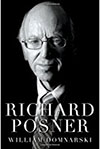
Reviewed by: James G. Apple, Editor-in-Chief, International
Judicial Monitor
The International Judicial Monitor has reviewed three of the
many books written by Richard Posner, a judge sitting on the United States
Court of Appeals for the Seventh Circuit in Chicago, Illinois (see International
Judicial Monitor, Archives at top of Home Page, Winter 2014, Fall 2014,
Spring, 2016). The judge has written more than 30 books during his 36 years as
a judge. In addition his writing credits include thousands of judicial
opinions, and hundreds of journal, magazine and newspaper articles. Although he
is not a household name in the United States, he is widely known in legal and
academic circles.
Several years ago I was talking with a judge of the Maryland
Court of Special Appeals (intermediate appellate court) about an upcoming
program of the International Judicial Academy (of which I was then President).
I happened to remark that the International Judicial Monitor had
recently published a review of one of Judge Posner’s books. She immediately
brightened and commented that when she was doing legal research for some
opinion on which she was working, she was always pleased when she came across
an opinion by Judge Posner, because his opinions were always so well written
and easy to understand.
Now veteran lawyer and writer William Domnarski of
Riverside, California, who practices exclusively in the federal courts, has
written a very revealing and comprehensive biography of Judge Posner. The book
is not an obsequious account of Judge Posner’s life to date – it is objective and
balanced in offering a factual account of the his life as well as an analysis
of his contributions to law and the legal world. It is based on the author’s
access to Posner archives at the University of Chicago and interviews with over
200 persons known to Posner and with whom he has has come into contact from
grammar school through his university career, including teachers, and his
colleagues on the bench and his law clerks. As the dust jacket on the book
states: “ William Domnarski examines the life experience, personality, academic
career, jurisprudence and professional relationships of his subject with depth
and clarity.” Another tribute there is that the judge is “one of the great
legal minds of our age, on par with such generation defining judges as Oliver
Wendell Holmes, Learned Hand, and Henry Friendly.”
The book, as is true with most biographies, begins with his
early life, describing the circumstances of his birth in Manhattan to his parents,
both from Eastern Europe (Austria and Romania). He went to grammar school and
high school in New York City and a suburb, Scarsdale, New York; college at Yale
and Harvard Law School. He was an accomplished student in every school he
attended, graduating first in his class at Harvard and serving as president of
the Harvard Law Review. Domnarski brings out a curious fact about Judge
Posner in his early life – he never really considered becoming a lawyer until
late in his college career – he wanted to become a writer, and majored in English
literature in college. He considered proceeding to a graduate degree in that
subject before applying to both Harvard and Yale law schools. There is however no
explanation in the book for Posner’s change of career choices.
Harvard Law School proved to be the right choice for the
judge. He loved law school, did well in it and “Harvard became the greatest
experience of his life.” Domnarski spends several pages focusing on “Posner at
Harvard Law School” which offers insights on Posner both as a student and a personality,
continuing the development of Posner’s student years in the section on “Posner
at Yale.”
Posner became a Supreme Court law clerk after law school for
Judge William Brennan, followed by several positions in the
federal government. The next chapter covers his time at the University of
Chicago Law School, which was where he first ran into and then was in the
forefront of the law and economics movement. The

 International
Judicial Monitor
International
Judicial Monitor